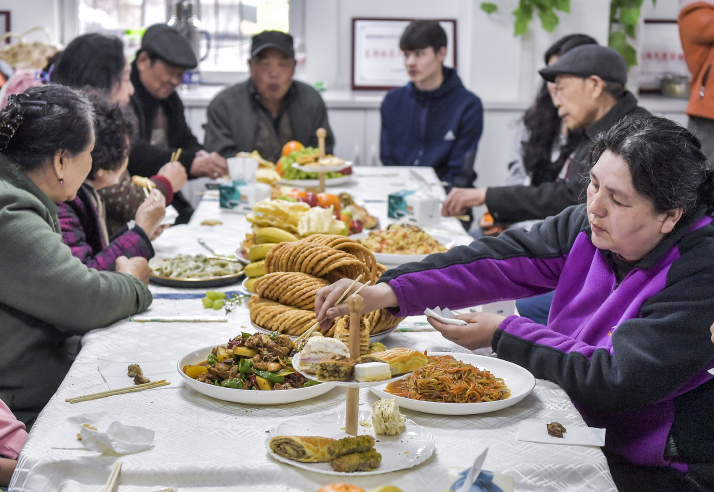| Xinjiang Today |
| Eid Mubarak | |
|
|
 A Roza Festival potluck in a community in Urumqi on April 10, 2024 (CNSPHOTO)
Eid al-Fitr (Festival of Breaking the Fast) is one of the three major Islamic holidays, celebrating the successful completion of a month-long fasting period. In Xinjiang Uygur Autonomous Region, it is commonly known as the Roza Festival—the term "Roza" deriving from Persian, meaning "fasting." A public holiday in the region, it fell on March 31 this year. The origins of the Roza Festival can be traced back to the prosperity of the ancient Silk Road. Around the ninth century, as trade flourished with Central Asia, Central Asian customs gradually blended with local farming and nomadic traditions, forming the unique regional celebration in Xinjiang. In modern Xinjiang, Roza Festival celebrations intertwine Islamic traditions with the local culture. On the eve of the festival, households thoroughly clean their homes, decorate their courtyards and shop at bazaars for festive items like sangza (crispy fried dough twists), dried fruits and new clothes. On the day of the festival, Muslims make their morning prayers at the mosque. Families gather to share Xinjiang specialties such as pilaf and whole roasted lamb while exchanging gifts like almonds and figs. Social customs include younger generations offering blessings to elders, who reciprocate with gifts or money, and neighbors sharing food. The Uygur community often organizes lively Meshrep (traditional Uygur music and dance gatherings), while pastoral areas organize nomadic activities like goat grabbing and horse racing. Goat grabbing, also known as Buzkashi, involves horsemen competing to seize a goat carcass and carry it to a goal. The Roza Festival is a unifying celebration for all ethnic groups in Xinjiang, symbolizing solidarity and gratitude. To experience its unique charm, visitors can start their day at iconic mosques like the Shaanxi Grand Mosque in Urumqi or the Id Kah Mosque in Kashi (Kashgar), immersing themselves in solemn recitations (while respecting prayer areas by remaining quiet). Festive performances often liven up the streets of Kashi's Old City and Turpan's Grape Valley, where travelers are welcome to join in the dancing fun or arrange homestays through local agencies. Holiday bazaars at the International Grand Bazaar in Urumqi or Kashi's Livestock Market offer handicrafts and snacks like samosas (flaky golden pockets with juicy fillings of spiced mutton) and nut cakes. People can also participate in these events virtually via livestreams on the official account of the Xinjiang Tourism Promotion Center on Douyin, the Chinese version of TikTok, or explore online exhibitions of the Xinjiang Museum to delve deeper into the festival's cultural roots. |
|
||||||||||||||||||||||||||||
|